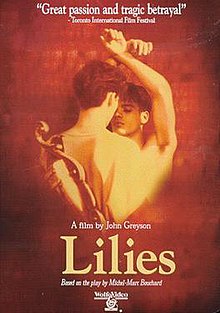The play within the film
Most of the film consists of the play within the film, presented by the inmates for Bilodeau and Doucet. Because it is taking place within a prison, the female roles are portrayed by the male prisoners. The young Bilodeau and Simon are performed by younger inmates (Matthew Ferguson and Jason Cadieux).
The play dramatizes a period during Bilodeau and Simon's childhood in Roberval, Quebec, when they were both coming to terms with their homosexuality. Simon has a romantic relationship with Vallier (Danny Gilmore), while Bilodeau remains repressed and tries desperately to convince Simon to join the seminary with him. All three are involved in a school play dramatizing the martyrdom of Saint Sebastian, with Simon in the lead role. The St. Sebastian play's homoerotic undertones contribute to Bilodeau's sexual awakening, which involves an unrequited love for Simon. Bilodeau recognizes the nature of the relationship between Simon and Vallier, and confronts them one afternoon after the rehearsal of the St. Sebastian play. Simon and Vallier attack and subdue Bilodeau, so that Simon can engage him in a derisively passionate kiss. In the middle of the kiss, Vallier's mother, the Countess de Tilly (Brent Carver) enters the arena, forcing Simon to break off the kiss and flee. Vallier's mother (who is slightly insane) is unperturbed at what she has seen, and has Vallier escort her to the arrival of a Parisian aristocrat arriving in a hot air balloon.
Simon's father is also at the arrival, where Vallier's mother unwittingly reveals to him that she saw his son passionately kissing Bilodeau. In a rage, Mr. Doucet finds Simon and brutally beats him, to the point where he must find medical attention for his wounds. He chooses to see a Parisian doctor staying at the hotel in town (to avoid the town doctor telling his business), and he meets Lydie-Anne (Alexander Chapman), a young Parisian baroness. Because of the beating, Simon renounces his love for Vallier and appears to fall in love with Lydie-Ann, eventually becoming engaged to her. However, Vallier's mother encourages Vallier to attend the engagement party and declare his love for Simon. At the party, it becomes apparent that Simon never stopped loving Vallier and was only using Lydie-Ann to pass as heterosexual. Because her feelings are hurt, Lydie-Ann reveals to Vallier's mother that her estranged husband is living happily in Paris with a new wife and child. She also tells her that she came to Roberval on the recommendation of Vallier's father, and while he mentioned structures and the landscape of the town, he never once spoke of the wife or child he left behind there.
After the party, Simon and Vallier meet for one last romantic encounter. Afterwards, Vallier's mother says that she will be going to Paris, and invites Simon and Vallier to see her off. Instead, she leads them to a place in the woods, where she lies down in a shallow grave and has Vallier strangle her to death. Bilodeau witnesses the murder, and is spurred to confess his love for Simon. When rejected, he sets fire to the room where Vallier and Simon are staying and locks the door, trapping Vallier and Simon. Bilodeau is remorseful and returns in time to drag Simon to safety, but leaves Vallier behind, and falsely tells arriving policemen that Vallier already dead,and Vallier perishes in the flames.
